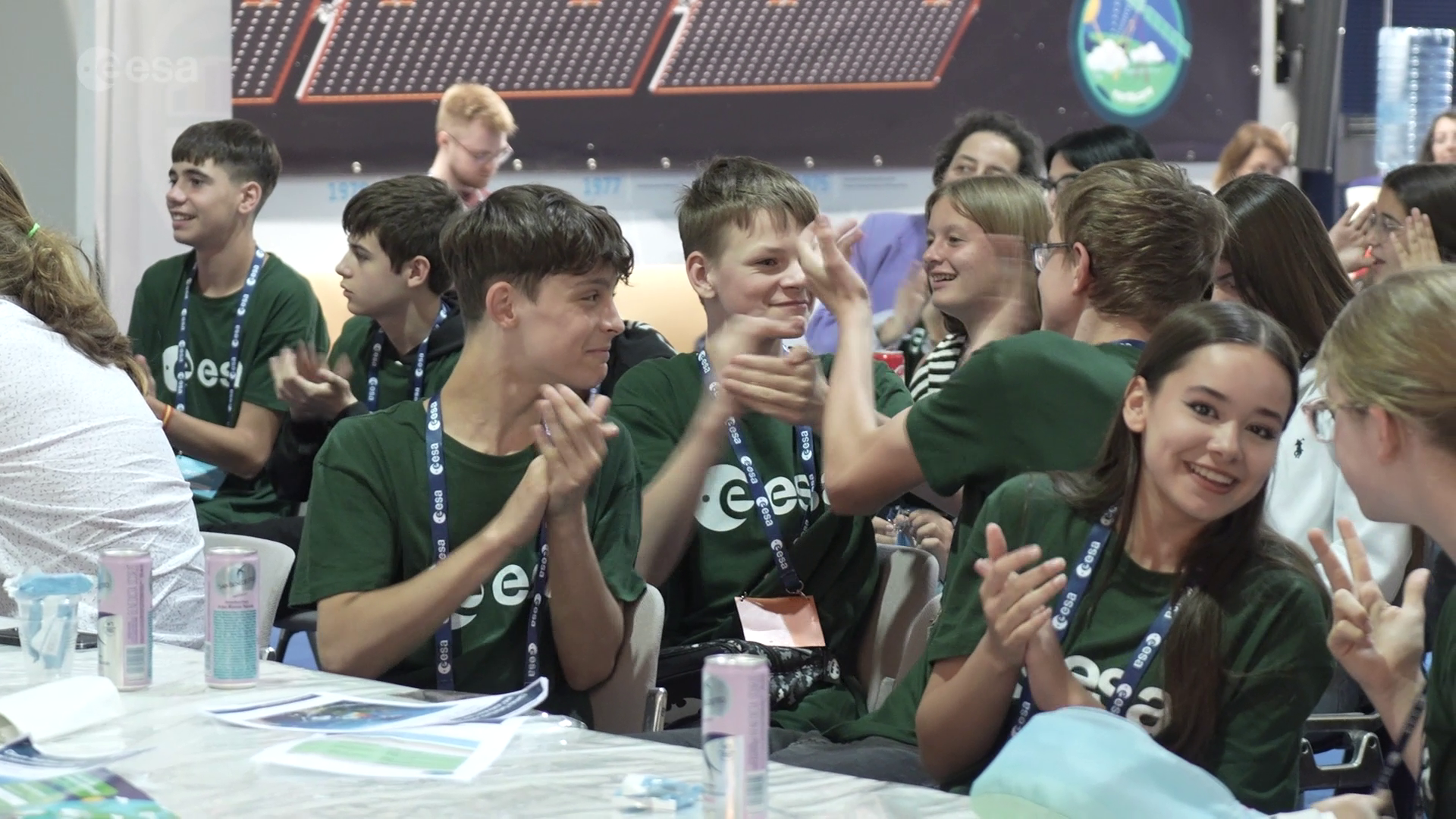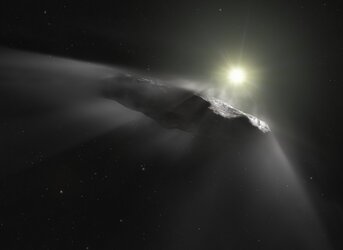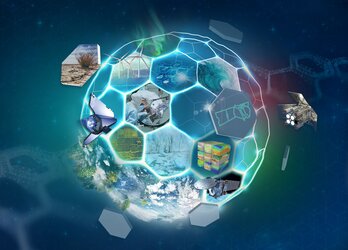Climate Detectives Learning and Celebration Event 2024: Highlights
In brief
Buzzing students, proud mentors, and focus on environment and climate – this was the scene at ESA’s European Space Research Institute (ESRIN) on 20 and 21 May 2024. Over those two days, the national selected Climate Detectives teams from across Europe gathered at ESRIN for the inspiring Learning and Celebration Event, concluding this year’s edition of the Climate Detectives project. The teams and their mentors engaged with Earth observation experts, rolled-up their sleeves for hands-on workshops and explored the ESRIN visitor centre and the Φ-Experience.
In-depth
Check out the incredible teams and dedicated educators in action! Take a glimpse into the fun and action from the day by watching our 'Climate Detectives Learning and Celebration Event Highlights' video.


Access the video
18 outstanding 2023-2024 Climate Detectives teams were selected to participate in the event, where they had the opportunity to present their work to their peers and Earth observation experts. Interested in learning more? Read the summaries of each team’s project below.
BG/BRG 19 Billrothstraße 75, Austria – The team reviewed literature and analysed existing data, gathered from across Austria, to gain an overview of Austria's climatic challenges. They studied carbon dioxide and methane emissions in different regions of the country, and investigated how tourism contributes to changes in the climate and environment. The team also explored how water levels and temperatures have changed overtime in Austria’s lakes.
College Hagelstein, Belgium – In their project, the students from Belgium calculated how many solar panels their school would need to run on renewable energy. In addition, they investigated the number of solar panels needed to meet the total energy need in Belgium.
Technecium - UTESLA, Czech Republic – The team focused on the protection of endangered water life, such as microscopic organisms, coral reefs and sea turtles, as well as the conservation of plants on land. They gathered data with self-made Internet of Things (IoT) and robotic platforms, and remote sensing data from drones and unmanned aerial vehicles.
Høje Taastrup Gymnasium, Denmark – The Danish team explored multiple topics using satellite imagery. They investigated how urban areas are much warmer than surrounding rural areas, also called the “urban heat island effect”, and the rain and snow formation over cities. The team also reviewed ways to safeguard cities against climate change in the future.
Tampereen Klassillinen Lukio, Finland – A single student built an autonomous device to measure the carbon exchange between water bodies and the atmosphere. The student compared the measurements with existing studies.
Collège Paul Esquinance, France – The team investigated the link between local wildfires and global warming using Copernicus Sentinel-2 data. The students used Normalized Difference Vegetation Index (NDVI) values and other satellite data visualizations to learn about the adaptation of maritime pines to changing weather and climatic conditions.
1 GEL Aigiou, Greece – Using various methods, the team aimed to find how delayed autumn, and consequently winter, are because of rising temperatures in the area. They used satellite data and their own programme to calculate the green or brown colour of the tree leaves in satellite photos to conclude their investigation.
CBS Roscommon, Ireland – The team used an Air Quality Platform (AQP) and testing equipment from their local council to investigate the air quality around their school. They measured levels of different sized aerosols in the air and, as a result, recommended the school buses turn off their engines when waiting on the school grounds.
I.T.I. OMAR, Italy – The students analysed microplastics in the city air and water of Lake Maggiore. Following the results, they tested a method to remove microplastics originating from household washing machines. The method uses magnetic nanoparticles created with various low-cost, environmentally friendly processes.
Ecole Sainte-Sophie de Luxembourg, Luxembourg – The team investigated plastic waste in the oceans, and researched “the 7th Continent”, a patch of floating rubbish in the North Pacific Ocean. In addition, they carried out an experiment to see how plastics degrade in water using the scientific research methodology.
Zespół Szkolno - Przedszkolny nr 12, Poland – The young team from Poland worked on the shifting seasons and explored how climate change affects the seasons. They experimented with how to measure the seasonal changes and the role of climate change with simple and low-cost gadgets.
Agrupamento de Escolas de Ponte de Sor, Portugal – In their project "Os Bastidores do Vinho" ("Behind the scenes of wine" in English), the team researched the influence of climate change on grapevines’ vegetative cycle and productivity. Using Sentinel-2 satellite images, Normalized Difference Vegetation Index (NDVI) values, and data on grape production, precipitation, and temperature, the team investigated the problem concerning their region.
Ovidius Highschool Constanta, Romania – The Romanian team created an experimental photobioreactor: a system to grow microscopic algae inside an enclosure. They focused on the use of algae to reduce greenhouse gases to lessen pollution, and to treat wastewater for a cleaner future.
Gymnázium Poštová 9, Slovakia – The team measured the air quality during the past winter and spring in several places, including both in nearby cities and in the countryside. They shared their recommendations to increase the use of renewable energy sources, especially in the countryside, to improve air quality.
SC Ptuj, Slovenia – The team from Slovenia designed a proposal for selling and buying carbon dioxide (CO2) coupons. The forest owners could sell CO2 coupons to high-emission companies – this, in turn, would make the preservation of forest more profitable and promote sustainable practices. By promoting this idea, the team wants to make a difference in how companies and organisations reduce pollution and, as a result, the harmful effects of greenhouse gases on the ozone layer and living beings.
IES El Torrelló, Spain – Looking into the economic impacts of climate change, the team analysed natural disasters from 2023 in their province. They used Sentinel-2 satellite images to research fire expansion and the influence of heavy rain. They then devised several recommendations to reduce the impact on the local communities.
Västerbergslagens utbildningsförbund, Sweden – Using satellite images, the team investigated how mining has historically and recently affected the local environment and community. They documented the current state of a landfill, reviewed plans by a mining company, and collected opinions and concerns about reopening the mine from the local citizens.
Next Gen Ninja, UK – The team from UK assessed the local residents’ awareness of electronic waste and contacted the local waste management facilities to find out how electronic waste is handled in the area. The team developed several tools that use artificial intelligence, to raise awareness about electronic waste and help people understand how it can be managed.
This year we had over 150 Climate Detectives teams completing the entire project investigation cycle, including identifying a climate or environmental problem, collecting and analysing data, and proposing actions to address the problem. More projects from this year, as well as previous editions of Climate Detectives, are available to see in the online project gallery.
Congratulations to all participating teams for their innovative Climate Detectives investigations. Well done!














 Germany
Germany
 Austria
Austria
 Belgium
Belgium
 Denmark
Denmark
 Spain
Spain
 Estonia
Estonia
 Finland
Finland
 France
France
 Greece
Greece
 Hungary
Hungary
 Ireland
Ireland
 Italy
Italy
 Luxembourg
Luxembourg
 Norway
Norway
 The Netherlands
The Netherlands
 Poland
Poland
 Portugal
Portugal
 Czechia
Czechia
 Romania
Romania
 United Kingdom
United Kingdom
 Slovenia
Slovenia
 Sweden
Sweden
 Switzerland
Switzerland

























